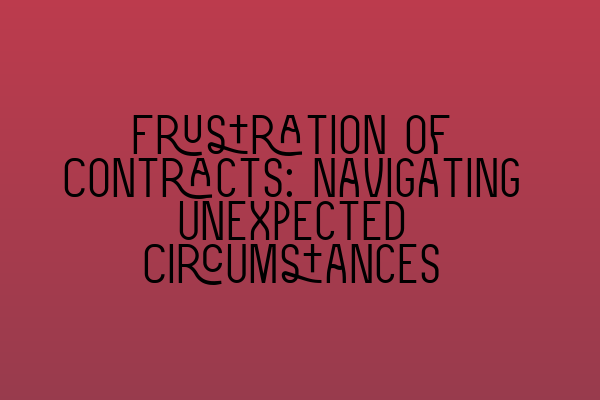Frustration of Contracts: Navigating Unexpected Circumstances
Contracts are the foundation of any business transaction or legal agreement. They provide parties with a sense of security and define the rights and obligations of each party involved. However, what happens when unforeseen circumstances arise that make it impossible to fulfill the terms of a contract? This is where the concept of “frustration of contracts” comes into play.
Understanding Frustration of Contracts
Frustration of contracts occurs when an unforeseen event renders the performance of a contract impossible, illegal, or radically different from what was initially expected. It essentially makes it impossible for either party to fulfill their obligations as originally agreed upon.
Such unforeseen events may include natural disasters, changes in legislation, war, pandemics, or any other event beyond the control of both parties. Frustration of contract acts as a safeguard, providing relief to parties who find themselves in impossible circumstances.
Legal Implications of Frustration of Contracts
When a contract is frustrated, it is automatically terminated, and the parties are discharged from any further obligations. However, the consequences of frustration may vary depending on the jurisdiction and the specific terms of the contract.
In the UK, the legal framework that governs frustration of contracts is provided by the Law Reform (Frustrated Contracts) Act 1943. This Act allows for the recovery of any money paid under the contract or for the retention of any benefits received before the frustration occurred.
It’s important to note that frustration of contract is not the same as breach of contract. While frustration occurs due to events outside the control of the parties, a breach of contract involves a failure to perform on the part of one of the parties.
Navigating Frustration of Contracts
When faced with a potentially frustrated contract, it is crucial to seek legal advice. An experienced contract solicitor can assess the situation and determine if frustration is applicable. They can guide you through the legal process, ensuring that your rights are protected and that you understand the implications of frustration on your contract.
It’s also important to review your contract carefully to determine if any clauses address frustration. Some contracts may include force majeure clauses, which allocate the risk and responsibilities in the event of unforeseen circumstances. These clauses may provide specific provisions on how frustration is to be handled within the contract.
Moreover, keeping thorough documentation of any changes or circumstances that lead to frustration is crucial. This can help support your case and provide evidence in any legal proceedings. Additionally, it’s advisable to maintain open communication with the other party and attempt to negotiate a resolution if possible.
Conclusion
Frustration of contracts is a complex area of contract law that requires careful consideration and expert legal advice. When faced with unforeseen circumstances that make it impossible to fulfill the terms of your contract, seek the guidance of a contract solicitor to protect your interests and navigate the legal implications.
For more insights into legal practice and decision-making, check out our article on Unveiling Real-Life Case Studies: Insights into Legal Practice and Decision-Making. Additionally, if you’re interested in the financial aspect of being a solicitor, our article on Exploring Solicitor Salaries in the UK: Average Earnings and Factors Affecting Income provides valuable information. Furthermore, enhancing client relationship management skills is essential for any solicitor, and our article on Mastering Client Relationship Management: Skills for Solicitors to Enhance Trust and Loyalty offers valuable insights. If you’re considering a career in law, our article on Pursuing a Law School Education in the UK: Choosing the Right Path for Your Future can guide you. And, if you’re on the path to becoming a solicitor, our article on Securing Training Contracts: A Roadmap to Becoming a Solicitor provides a helpful roadmap.
